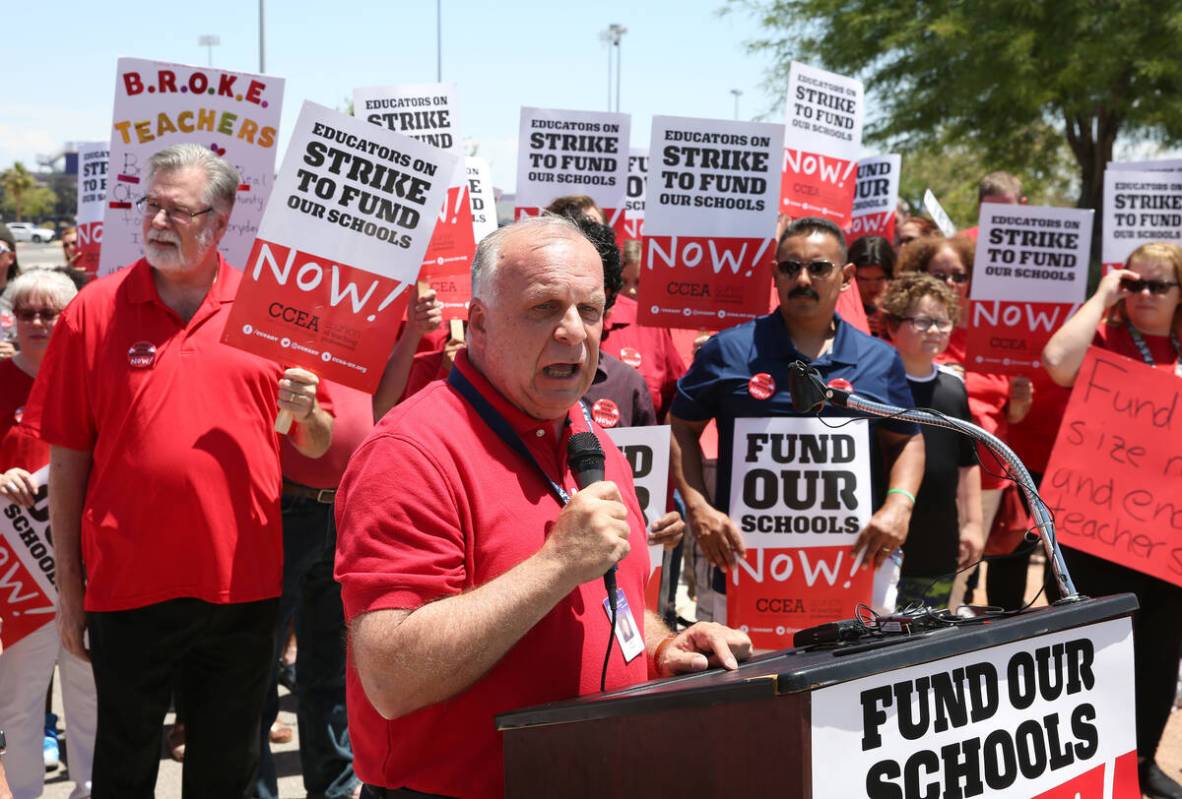Why California teachers strike, and Nevada teachers don’t

School employees in the Los Angeles Unified School District shut down schools after kicking off a three-day strike Tuesday to demand better wages and increased staffing.
In Las Vegas, some might wonder: Why don’t Clark County School District employees do the same?
The answer: It’s illegal.
Under Nevada law, strikes by state and local government employees, which includes public school employees, are prohibited.
Unions can be fined $50,000 per day for each day of a strike, with strike leaders facing a $1,000 fine — or even potential jail time — for each day of the strike.
Though Clark County schools nearly saw a teacher strike in September 2019 after two years of debate over educator pay, its last strikes occurred more than 50 years ago in April 1969, including a one-day school closure for over 68,000 students.
The last CCSD employee strike
Clark County teachers went on strike for two days in April 1969 over teacher pay, starting with a non-union approved teacher walkout at Jim Bridger Junior High on April 17. Students also held demonstrations starting two days earlier at several valley middle and high schools.
After a supermajority of the Clark County Teachers Association voted to strike, teachers marched down the Strip the next day to the Desert Inn Hotel, where businessman Howard Hughes lived at the time.
The idea to march to Hughes’ residence was inspired by high school teacher Joe Foss, who wanted to “assemble at the residence of a well-known Nevada taxpayer.”
Then-CCSD Superintendent James I. Mason encouraged parents to support the teacher’s request for salary increases on the day of the strike, saying in a statement, “We know the teachers invoked this work stoppage only after they had exhausted all other remedies.”
About 1,500 teachers also marched on the Strip on April 18 in a route that also included passing by Hughes’ residence.
Four months later, just before Labor Day weekend, the Nevada Legislature passed the statute making public employee strikes illegal.
What is the law?
Nevada isn’t alone in banning public teacher strikes. In fact, you’re more likely to live in a state that bans teacher strikes than not.
Thirty-five states prohibit public school teacher strikes, while three states, Wyoming, Utah and South Carolina, don’t have explicit laws. California is one of the few states that do allow public school teachers to strike.
The reason why the Culinary Workers Union can strike but CCSD employees can’t is because of federal protections for private sector employees to strike, according to Ruben Garcia, a law professor at UNLV.
However, states have the authority to set collective bargaining terms, including around strikes, for their state and local employees.
One challenge that makes unionizing difficult in Nevada is the state’s “right-to-work” law, which means that unions cannot require employees covered by the union to pay dues.
Garcia said employees — even those not covered by a union contract — cannot be fired for joining a union or seeking to bargain, even in a right-to-work and at-will employment state like Nevada.
Last year, unions also bargained for the highest pay increases since 1990 for average first-year wage increases in labor contracts, according to Bloomberg Law.
“Workers today are feeling that they have some leverage in terms of labor conditions, the labor market, and they are seeing in other states gains under collective bargaining agreements,” Garcia said. “That gives workers the idea that they could be asking for more, and they may be bargaining more strongly for higher wages in this environment,” he said.
Although it is illegal for Nevada public school teachers to strike, Garcia said other alternative forms of protest could grow in popularity among teachers, like public demonstrations and picketing.
“We may see more of that activity as workers feel like they’re looking for a bigger share of the wage, especially in this inflationary environment,” he said.
This story has been updated to clarify the timeline of strikes in 1969 and the right-to-work or at-will protections for employees in Nevada.
Contact Taylor Lane at tlane@reviewjournal.com. Follow @tmflane on Twitter.